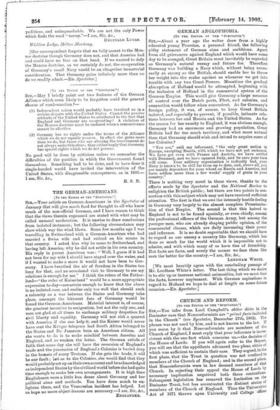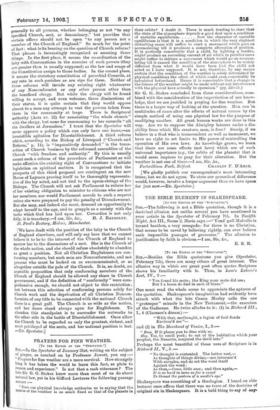CHURCH AND REFORM.
LTO THE EDITOR OF THE "SPECTATOR:1
Sr,—You infer from Lord Campbell's obiter dicta in the Ilminster case that Nonconformists are "prima' facie included in the Church" (see Spectator, December 27th, 1902). The phrase was not used by him, and is not known to the law. If you mean by it that Nonconformists are members of the Church of England, I must reply that your inference is incon- sistent with the one fact which concerns us,the decision of the House of Lords. If you will again refer to the Report, you will see that the appellants advanced two pleas, either of which was sufficient to sustain their case. They argued, in the first place, that the Trust in question was not confined to members of the Church of England; and in the second place, that nonconformists were in law deemed members of that Church. In rejecting their appeal the House of Lords by necessary implication negatived both these contentions. Subsequent legislation has removed the limitation on the Ilminster Trust, but has accentuated the distinct status of members of the Church of England. Thus the Universities Act of .18'71 throws open University and College Ace' generally to all persons, whether belonging or not "to any specified Church, sect, or denominary," but provides that certain offices should not be open "to any person not a member of the Church of England." So much for the point of fact: what is its bearing on the question of Church reform? That phrase is increasingly recognised as meaning three things. In the first place, it means the co-ordination of the laity with Convocations in the exercise of such powers (they are greater than is usually supposed) as the law and usage of the Constitution assign to those bodies. In the second place, it means the statutory constitution of parochial Councils, at any rate in such parishes as are ripe for them. Neither of these reforms will invade any existing right whatsoever of any Nonconformist or any other person other than the beneficed clergy. But while the clergy will be found willing to accept, and even welcome, these diminutions of their status, it is quite certain that they would oppose almost to a man any attempt to vest the powers taken from them in the community at large. There is Scriptural authority (Acts xv. 22) for associating "the whole church" with the clergy, but none for summoning to her councils "all the dwellers at Jerusalem." I trust that the Spectator will never approve a policy which can only have one issue,—an irresistible agitation for Disestablishment. A third reform which, according to the Bishop of Liverpool (" Church and Reform," p. 11), is "imperatively demanded" is the trans- action of Church business by the reformed assemblies of the Church "with freedom and authority." By this is usually meant such a reform of the procedure of Parliament as will make effective the existing right of Convocations to initiate legislation on spiritual matters. It is recognised that the prospects of this . third proposal are contingent on the new House of Laymen proving itself to be thoroughly representa- tive of the lay mind, and not tied to the apron-strings of the Bishops. The Church will not ask Parliament to relieve her of her existing obligation to minister to citizens who are not her members, nor would Parliament accede to such a request unless she were prepared to pay the penalty of Disendowment. But she may, and indeed she must, demand an opportunity to adapt herself to the age, and to grapple as a society with the tasks which God has laid upon her. Cowardice is not only folly, it'is treachery.—I am, Sir, &c., H. J. BARDSLEY. St. Paul's Rectory, Hulme, Manchester.
[We have dealt with the position of the laity in the Church of England elsewhere, and will only say here that we cannot believe it to be to the interest of the Church of England to marrow her to the dimensions of a sect. She is the Church of the whole nation, and she should refuse absolutely to abandon so great a position. Not all Christian Englishmen are con- forming members, but such men are Nonconformists, and not persons who must be looked on as excommunicated, or as altogether outside the pale of the Church. It is, no doubt, an arguable proposition that only conforming members of the Church of England should be allowed any share in Church government, and if the definition of " conformity " were com- prehensive enough, we should not object to this restriction; but between this selection of conforming persons solely for Church work and the deprivation of all Christian Noncon- formists of any title to be connected with the national Church there is a great gulf. The Church is as wide as the nation, and her doors stand always open for Englishmen. To abandon this standpoint is to surrender the outworks to the other side in the battle of Disestablishment. Once allow the Church to be regarded as only the greatest, richest, and most privileged of the sects, and her national position is lost. —En. Spectator.]







































 Previous page
Previous page